Buying A Motorhome? Here’s What We Considered When Buying Ours
If you’re thinking of buying a motorhome it can be an equally exciting and daunting time. With such a huge range of different types of motorhomes and campervans available it can be hard to decide which is the right one for you. We know because we’ve done it three times, and it never gets any easier.
Below we’ll go through few areas to help inform your thinking, based on our own experience and folks we’ve chatted with on the road.
Who Will Use It, And Where?
Our main piece of advice would be to firstly carefully think about who will be using the motorhome. How many people will be travelling and/or sleeping in it. Also think about where and what you’ll be using it for. Will you be mainly staying on campsites in the UK, in which case you could use their shower facilities or pick places with caravans or cabins to rent if other family members want to join you. If you think you’ll be wild camping your way across Europe think about maybe getting a left hand drive van, with onboard shower and toilet facilities. Either look for vans with off-grid motorhome equipment installed, or budget to add your own. Establishing these basics first will help you to whittle down the vast range of layouts, sizes and weight features of the van.
How Much Do You Have To Spend?
The amount you want to spend probably won’t restrict which type of van is available to you. Panel vans, which you might imagine would be the cheapest, can be surprisingly expensive. A Class vans tend to lean towards the more expensive end of the spectrum, but we’ve bought second-hand ones, which are much cheaper than new panel vans. C Class are an all-round winner in terms of cost and features, and most of the vans we see touring Europe fit into this category.
How much do you need to spend to get the van you want though? That’s a difficult question to answer, it really depends on what make, model and age of motorhome or camper you want and can afford.
At the upper end of the spectrum, you’ll find luxury vehicles from makers like Concorde and RS, costing over £250,000 new. At the other end creative and energetic folks are buying old panel vans and fitting them out themselves (self-builds). Sometimes they use reclaimed materials, keeping the cost of the van and the interior fit-out to below £8,000.
In the order we bought them, our vans cost us:
- £9,500 (an Autosleeper Harmony conversion on a Talbot van, from a dealer),
- £10,500 (a 20-year-old Hymer B544 A Class, from eBay), and
- £16,800 (an 18-year-old Hymer B544 A Class, from eBay).
We’ve used the B544s very heavily, travelling tens of thousands of miles across a continent or two. As they were older vans, we’ve had to do some repairs as we travelled, but we’ve had the time to resolve any issues and the costs involved still left us with a huge saving compared to buying newer vehicles.
Used vans at dealers tend to be in the £25,000 to £45,000 range. Buying from a dealer will give you more peace of mind, as they’ll often come with a warranty against some types of fault. You’ll also be able to more easily look around their entire selection of vehicles, helping you get a feel for what really works for you (although you can do that and then buy privately, of course).
Buying a brand-new van gives you the option to get the exact specification you want, including any extras like solar panels and upgraded leisure batteries. Everything will, of course, work perfectly or be fixed under warranty. You won’t need to get an MOT for three years. You’ll also get one of the cleaner engines available, enabling you to access low emission zones across Europe, if that’s your aim. Brand new vans start around the £50,000 mark.
Running Costs
Don’t forget, once you’ve bought your van, you’ll need to budget annual costs for running it (these figures are rough estimates folks):
- Depreciation – maybe 10% a year for new vans, 5% for older ones
- Insurance – from £250 to over £1,000 for full-timing across Europe
- Road Tax – around £280
- MOT – around £55
- Service – around £250
- Habitation Service – £200
- Repairs – £500
- Consumables – tyres/exhaust/batteries – £300
On a £30,000 motorhome depreciating at 5% a year this equals around £3,400 a year. That’s before spending anything on fuel.
The amount of fuel you’ll use will depend on the distance you drive. A diesel van which returns 23MPG (most newer vans will do better than this) would burn 10.2 litres per 100km (mpg.webix.co.uk). At £1.30 per litre of diesel, driving 10,000km (about 6,000 miles) would cost (10,000/100) x 10.2 x 1.3 = £1,326.
Finally, you’ll then need to add in your overnight site fees. In the UK these range from around £10 a night for farm camping with no electricity or shower block, to over £30 a night for two people with electricity on sites with a shower block and stabilised pitches. Prices tend to be higher in the summer and during school holidays. Campsite prices in continental Europe are similar (check out the Camping Card ACSI scheme for lower cost sites), but opportunities for cheaper off-site overnight stays are more abundant.
If you are thinking heading off on a long-term tour, to help you budget we’ve compiled a breakdown of our costs from touring Europe for a year in a motorhome.
Weight Matters
Each motorhome or campervan has a legal weight limit, typically from around 2,800Kg up to around 5,000Kg, referred to as the MAM (maximum authorised mass) as well as other acronyms like MTPLM (Maximum Technically Permissable Laden Mass). The vehicle can’t legally weigh more than this when being driven, including passengers, pets, water, diesel etc.
The MAM will be shown on a sticker or plaque on the motorhome, sometimes on the side, sometimes under the bonnet (ours is shown in both these places).
Your license will determine the maximum van weight you can drive. If you got your full UK car driving license before 1 January 1997, you’ll automatically have a C1 license, and can drive any van up to 7,500Kg. If you got your license after that date, you’ll have a C class license, and you’ll be limited to vans weighing up to 3,500Kg, unless you take an additional driving test (www.gov.uk/guidance/driving-a-van).
As well as limiting the vans you can drive, there are a few other weight-related bits and bobs to be aware of:
- Legally each axle also has a limit. Even if the van is under its overall limit you might still be legally overloading the rear axle with a moped in the garage, for example.
- Speed limits across Europe are often lower for vans over 3,500Kg, in the UK lower limits are based on the vehicle’s maximum unladen weight (3,050kg).
- Some countries across Europe require motorhomes over 3,500Kg to pay for tolls per km using an electronic box. Each country has a different box.
- Some bridges and stretches of road are also weight-limited, so you’ll need to plan your routes to avoid them.
- If you plan to tow anything, like a trailer or a car, check the motorhome’s tow weight, how easy it is to fit a tow bar and your license categories.
- When you turn 70 you will need a medical to drive vans over 3,500Kg.
If your van is overweight you risk being fined by the police, or worse not being able to stop in the event of an emergency, or a long downhill descent.
Some very large vans have an implausibly-low 3,500Kg weight limit. These vans probably have a low payload and it might only be possible to legally drive them with very few possessions or people inside.
Belted Seats And Berths
You’ll need to make sure your van has enough seat belts or child-seat lock points to cater for your entire party. If you want to use child car seats, make sure the belted seats are full 3-point belts and not just lap belts.
You’ll also need to be sure the van has enough comfortable beds (berths) for everyone. Ideally test the bed out before hiring or buying, even if you just whip your shoes off and try lying in the bed to see if you can stretch out.
Overcab beds and bunks can help to keep the living space accessible if not everyone goes to bed at the same time. Think about bedtime. Does the van layout allow the adults to comfortably stay up while the kids are in bed? If you’ve a family, are there doors or curtains to offer privacy at bedtime?
In Harvey (our first campervan) the bed was made up using the front seats, the two benches (and cushions) behind them and the table. This worked OK for short trips, but had some disadvantages for longer ones:
- The bedding took up lots of the under seat storage space.
- It was hard to make the beds up with two people inside the van.
- It took quite a bit of bending, huffing and puffing to lower the seats and get the various cushions and supports in position.
- The cushions were a compromise shape between sitting and sleeping, so were not best shaped for either of these (not flat enough for sleeping, too flat for sitting).
One of the main reasons for choosing our Hymer was the drop down bed above the cab. It has the advantages of a fixed bed, but the biggest advantage is that it takes up no room in the living area:
- The bed takes about 5 seconds to drop into place.
- It’s always made up, and no under seat storage is taken with bedding (apart from a spare set of duvet and pillow covers).
- It’s flat, comfortable and the corner isn’t missing from the bottom of it like on a lot of fixed beds; ours is also fitted with a memory foam topper for extra comfort.
- When the bed is down it has quite a lot of headroom, which we found lots of overcab beds didn’t.
The Hymer’s bed isn’t perfect though. It takes a bit of effort to push it back up when it’s loaded with bedding and pillows. Also we’ve left the ladder in storage in the UK to save space as the B544 layout has seats next to the bed, so we stand on those to climb in and out. Without the ladder you do need to be able-bodied to get in and out of bed. However, for us, these compromises are worth it for being able to have a bed ready made while keeping the length of the van as short as possible.
Driving the Motorhome
We knew we’d be racking up the miles, so there were several things we thought about when we came to looking at driving:
- Weight Limit – As mentioned above in the Weight Matters section above, you need to check your driving licence to ensure what size of motorhome you can legally drive.
- Left or Right Hand Drive – Our first campervan was right hand drive and for short trips into Europe it didn’t makes much difference – especially with Julie in the passenger seat to look for traffic at roundabouts and junctions. When we bought our motorhomes we knew we’d be spending most of our time abroad so we opted for left hand drive models as it makes it easier to see oncoming traffic and to position yourself for overtaking (mainly tractors and parked vehicles as we don’t actually go that fast ourselves).
- Where to Keep It – Not quite motorhome driving, but more will it fit on your drive? If not, where will you store it and will it be nearby enough so it’s easy to load up the van and head off. We currently store our motorhome at a CASSOA approved farm storage site which costs us £1 a day (www.cassoa.co.uk).
TOP TIP – The biggest challenge for us driving our motorhome has been getting used to the width. We use a trick the previous van owner taught us to position the van: we have stuck two pieces of tape on the windscreen by the windscreen wiper mounts. If the driver glances down at one and it is in line with the edge of the road, we’re almost as far over as we can go. If the other side is in line with the centre line, we’re about right on that side too. If we need to be more exact, we slow down and use the mirrors to check our position.
Power and Gas
Some thoughts on the electrical and gas supplies in the van:
- If you want to fit a solar panel, check there’s enough room on the roof.
- Gas bottles vary from country to country, so if you’re planning to travel abroad for long periods of time consider fitting a refillable LPG Gas system.
- If viewing a specific motorhome, ask to see a recent gas safety certificate from the seller, this will give you peace of mind that the gas system has been checked.
- A lot of motorhomes don’t have an oven, it’s worth thinking about how much cooking you’ll be doing in the van and how much of that would be in an oven. We’ve never had one, and while we do occasionally miss it, we prefer having an extra cupboard.
General Condition
A few thoughts on what to look out for on the general van condition:
- You’ll know quickly if you like the furnishings, veneer and so on; you’ll get a good feeling!
- If you can, it’s worth testing absolutely everything, even if you’re buying from a dealer. On our older vans, something has always been bust. Broken things should be fixed by a decent dealer, and are a good bargaining point on private sales.
- Look out for signs of water ingress; Dave has leaked around windows and skylights but we’ve repaired it quickly.
- On panel vans look out for rust repairs; it’ll come back through quickly once it has started.
- Check the windscreen for chips. Our Hymer has a huge windscreen and had some chips, but they’d been repaired and have caused no problems. Our insurance covers windscreen replacement but on an A Class it is sometimes more than the insurance maximum.
The main thing is that you want to know that the van part of the motorhome has been looked after, so try and get one with a full service history if you can. Also, don’t sweat the small stuff, any motorhome will be a compromise on something unless you have one specifically made for you, so if you really can’t stand the caravan style flowery fabric on the seats, they can be covered with throws.
Cheers, Jay and Ju
New to motorhome life,
planning your own motorhome adventure or
looking for the perfect gift for the motorhomer in your life?
Check out our OurTour range of books.

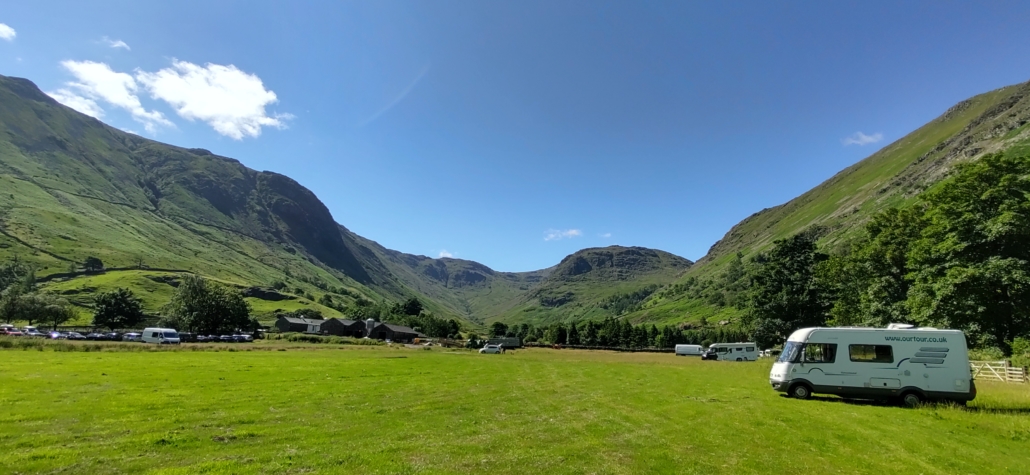

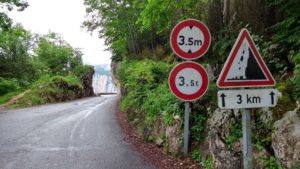
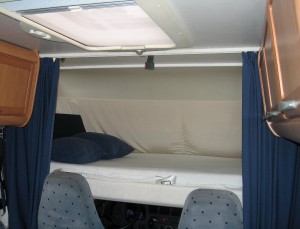
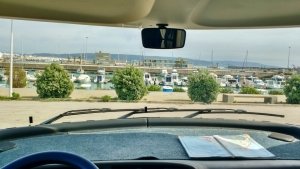



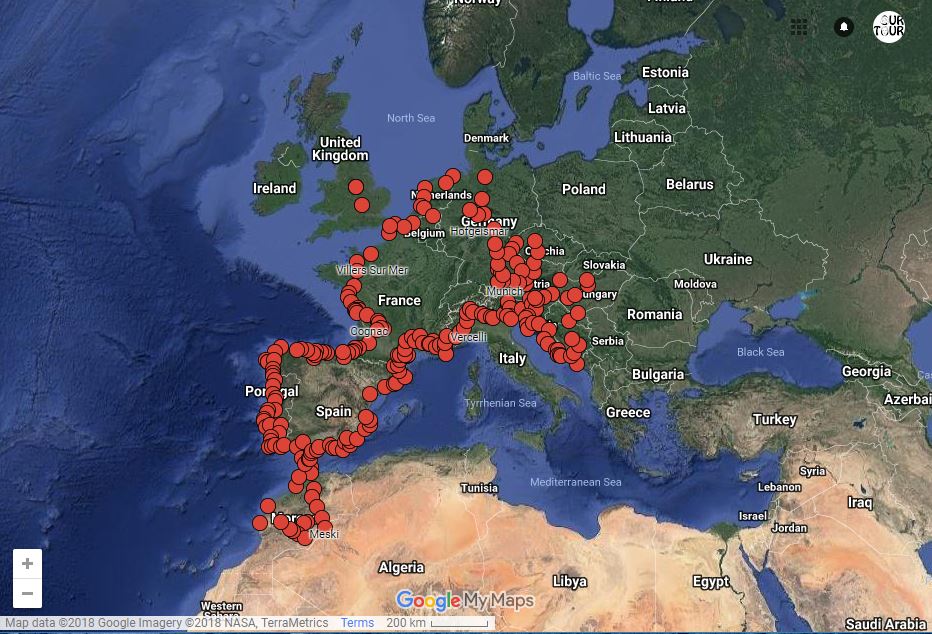
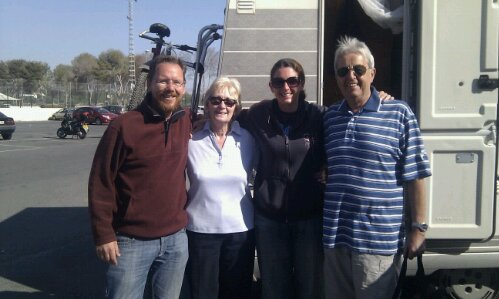
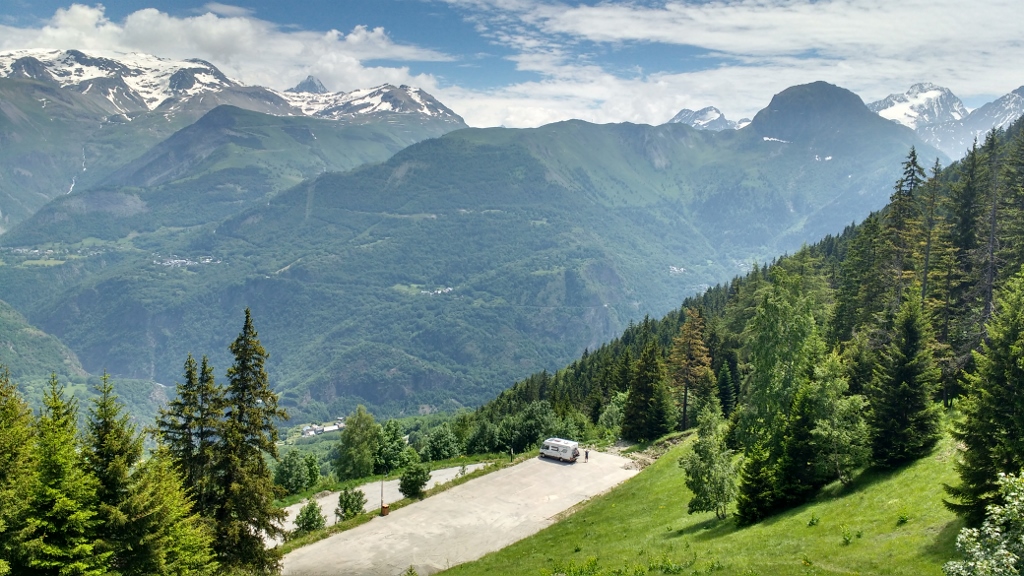
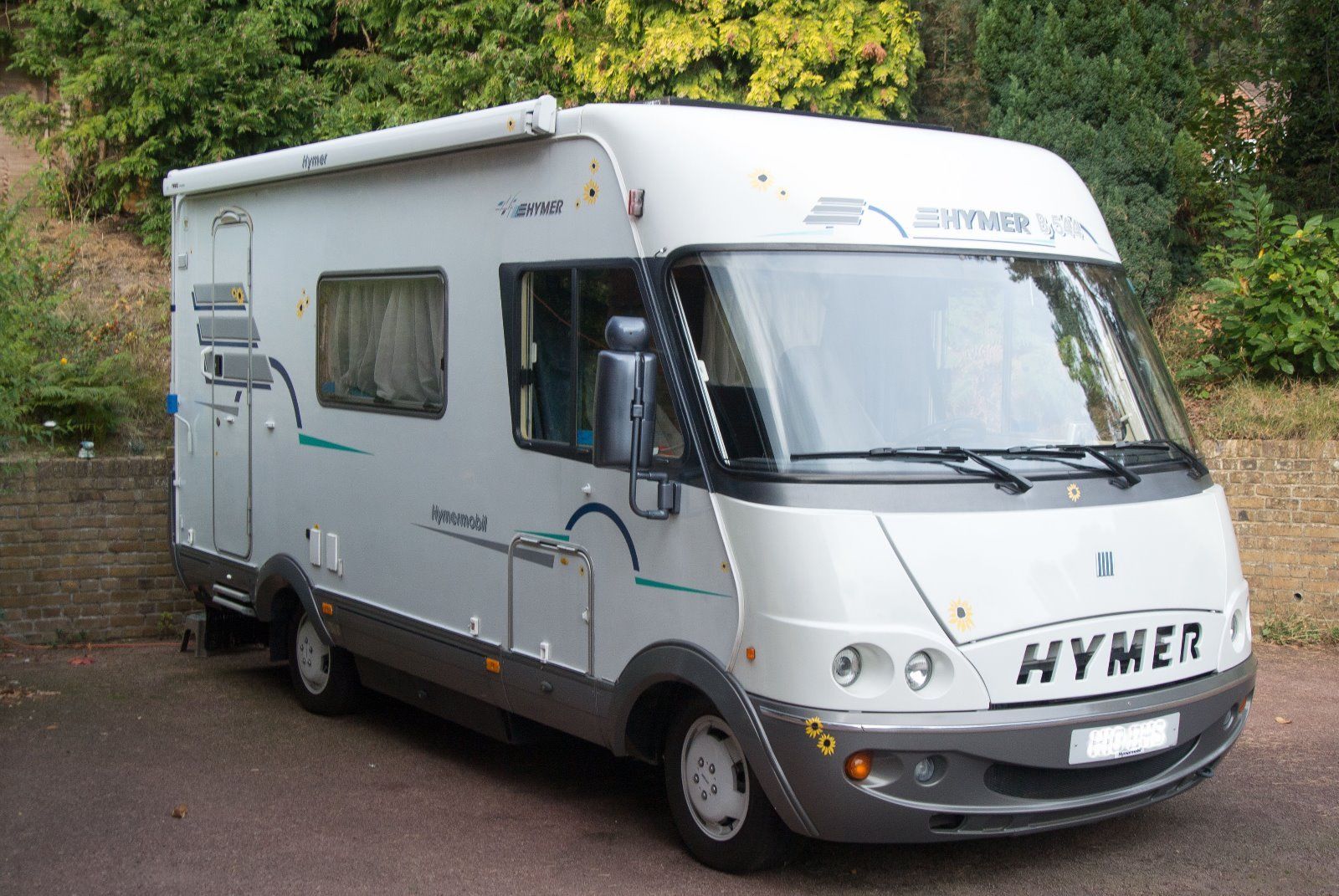


Thank you for a well timed blog we are off up Lowdhams for a second look at motor homes. We are first time buyers looking for exciting weekends away with our 3 children !!! Hope you are both well…loving following iour adventures x
Brilliant news. Motorhomes are perfect for holidays with kids. MMM magazine has a good section in the back each month about buying a motorhome – layout, vehicle type etc. Naomi Asher (was Bruton) has one too that she goes on hols with her girls, so she might be able to offer advice on the children side of things – she’s on Facebook. My advice would be to have a really good look around at all the different layouts. As well as Lowdham there’s Fullers just over the road and Oaktree motorhomes nr J28 of M1 – a bit further towards Mansfield than the designer village. They’re expensive things so do as much research as you can before you buy. If you’ve any questions please don’t hesitate to get in touch – feel free to email a load over to julieandjason@ourtour.co.uk – no matter how basic. Once you’ve got one, tell me all about it :-) Ju x
Thanks guys that’s great…very exciting and am sure we would love it…biggest dilemma is layout..whether to go for seating at back into double bed (so 2 children have to sleep together…) but we have more daytime accomodation or bunk beds so children sleep better … Amy thoughts? Have messaged Naomi on fb but don’t know how often she checks…thanks again have a great day x x
Thanks for this very useful post. I still hungrily absorb articles like this as, with 12 months still to go, there is still time to get things right. Build is going well. Do have a look at the conversion page of http://www.free-at-last.co.uk. If you would also ‘like’ on FB, I would be very grateful. Cheers. Robin
You’re welcome Robin! Have liked your blog, and had a read, looking good. A few other pointers which may be of use:
Can’t think of anything else but feel free to ask. Cheers, Jay
Hi
We are living in France and just sold our 1985 Renault Pilote… it gave us a taste of campervanning and we love it! Like you the bed-making-up got too much (especially on our 5 week trip to Spain and Morocco in Jan/Feb!
Discovered your site as we have bought the same model of Hymer 1991 and picking it up over Xmas in the UK! We are very excited about it…! Mind you it has done 140k miles!
Best wishes to you,
Val
Hi, I’m so pleased to have happened upon your travel, and great information, blog. Suzanne and I have been planning our post retirement motorhoming adventures for a few years and reading your website has been great fun. You have answered so many questions and offered such fantastic advice that we feel that the whole idea really is viable. With only a few months to go before we will start to act on our plans, may I say a big thanks! Cheers, Dominic and Suzanne.
Hi Dominic and Suzanne
Great to hear from you and glad you’re finding our site useful. The countdown is underway for you and I’m a little jealous, it was hard saying goodbye to everyone but the feeling of excitement was amazing.
Please keep in touch and let us know how your plans are coming along. If you’ve any random questions don’t hesitate to get in touch and we’ll answer them as best we can.
Cheers
Julie
Hi u Two,
Sounds like you to are having a great time.Wish we where there.
We are from NZ and are planning a trip next year, we are a few years older than u two.
We are planning on purchasing a motor-home on a buy back plan cause bringing it home is a bit of an issue.
We are planning on a trip to The Isle of Man for the TT as my brother in law is racing there and thought it would be a good way to see what works in the van and what doesnt before we head of to Europe.
We will keep reading your blogs.
Jan and Chris
Hi, Thank you for the good advice. I am currently looking for a motorhome but as I live in London I’m finding it difficult to find one within my price range (up to £20,000) which is LEZ compliant. I am looking for a van registered around 2006 (later would be nice) to ensure compliance rather than an earlier model with a filter fitted which requires regular cleaning, but they seem a little higher than my budget at present. I am also worried about parking the van when not in use as it would be a magnet to thieves in London so I would need to pay for storage. I admire you for travelling abroad, I’m not so sure that I would be ready for that yet! Thanks guys and take care.
Great article but “On a £30,000 motorhome depreciating at 5% a year this equals around £3,400 a year. That’s before spending anything on fuel.”? 5% * £30k = £1.5k surely
Or should this have been this “all adds up to”?
Yep. 👍